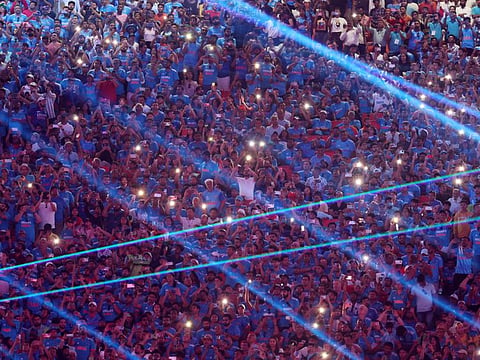Cricket to trial stop clocks to speed up play in ODIs, T20s
Cricket World Cup attracts a tournament-record 1.25 million spectators

New Delhi: The International Cricket Council on Tuesday said it will trial stop clocks between overs in men’s One-day and T20 internationals in a bid to speed up the game.
The move, approved after a meeting of the ICC board in the Indian city of Ahmedabad, will be put to the test from December to April.
If the bowling team is not ready to bowl the next over within 60 seconds of the previous over being completed, a five-run penalty will be imposed the third time it happens in an innings.
“The clock will be used to regulate the amount of time taken between overs,” the ICC said in a statement.
Slow-over rates in limited-over cricket have been a perennial concern and last year the ICC introduced penalties in both men’s and women’s cricket.
'Timed out'
Currently, if the fielding team fails to start the final over by the stipulated time, they are docked one fielder from outside the 30-yard circle.
This is in addition to the fines teams have to pay for slow over-rates.
Stop clocks are used in other sports including tennis in an effort to speed up games.
The issue of speeding-up play in cricket hit the headlines after Sri Lanka’s Angelo Mathews became the first batsman to be dismissed “timed out” in an international match during the just-concluded World Cup.
Mathews was declared out after he failed to take strike within the stipulated time of two minutes during Sri Lanka’s group match against Bangladesh.
Mathews attempted to argue he had a problem with his helmet strap, but the umpires had to uphold the decision when Bangladesh chose not to withdraw their appeal.
Record crowd
The Cricket World Cup attracted a tournament-record 1.25 million spectators during the 6 1-2-week event which ended Sunday with Australia beating India by six wickets for its sixth title.
The ICC said Tuesday that the tournament had 1,250,307 spectators. With six games to go, the spectator figures had already surpassed the one million mark.
The India attendance figures surpass the earlier marks of the 2015 World Cup held in Australia and New Zealand which attracted 1,016,420 spectators and the 2019 edition in England and Wales which had 752,000 fans.
The 10-team tournament in India saw each team play the others once to advance to the semi-finals. There were 48 matches played overall for a total average attendance of about 26,000.
It was the 13th edition of the Cricket World Cup first held in 1975.
Sign up for the Daily Briefing
Get the latest news and updates straight to your inbox



